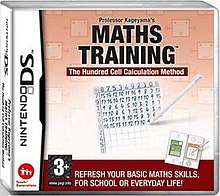Professor Kageyama's Maths Training: The Hundred Cell Calculation Method
| Professor Kageyama's Maths Training: The Hundred Cell Calculation Method | |
|---|---|
 | |
| Developer(s) | Jupiter |
| Publisher(s) |
Shogakukan (JP) Nintendo |
| Platform(s) | Nintendo DS |
| Release |
|
| Genre(s) | Puzzle game |
| Mode(s) | Single player, multiplayer |
Professor Kageyama's Maths Training: The Hundred Cell Calculation Method (DS陰山メソッド「ます×ますプレ百ます計算 百ますの前にこれだよ!」) (DS Kageyama Method: Masu x Masu Pure Hyaku Masu Keisan - Hyaku Masu no Maeni Kore Dayo!), is a puzzle video game published by Nintendo and developed by Jupiter for the Nintendo DS handheld video game console. It was first released in Japan, and was later released in Europe and Australasia. It was released in North America as Personal Trainer: Math on January 12, 2009.[2] It was also released in South Korea in 2009. The game is part of both the Touch! Generations and Personal Trainer series.[3] The game received mixed reviews, with common criticisms cited for the game's difficulty in recognizing some numbers and for not being very entertaining to play. At GameRankings, it holds an average review score of 65%.[4]
Gameplay
Maths Training, designed to be played daily, uses a method called "The Hundred Cell Calculation Method" that focuses on repetition of basic arithmetic. This method was developed by Professor Kageyama who works at the Centre for Research and Educational Development at Ritsumeikan University, Kyoto.[5] Utilizing a 10 x 10 grid of blank squares lined with rows of numbers along the top and side of the grid, the player has to match up each top number with each side number and add or subtract or multiply them. They then fill in the appropriate square with the appropriate answer.
The game is played by holding the Nintendo DS vertically like a book, and it supports both right- and left-handed users, allowing them to view the exercises on the message screen while they note down their answers with the stylus on the Touch Screen. The user can play against up to 15 other Nintendo DS users by using the DS Download Play option or with multiple game cards.[6][7]
See also
References
- ↑ Professor Kageyama's Maths Training: The Hundred Cell Calculation Method Information
- ↑ Cooking Guide, Maths Training, Walking Rhythm DS rebranded for US
- ↑ Nintendo Launches Personal Trainer: Cooking For Nintendo DS
- ↑ Professor Kageyama's Maths Training: The Hundred Cell Calculation Method Reviews
- ↑ Professor Kageyama's Maths Training Review // DS /// Eurogamer
- ↑ Professor Kageyama's Maths Training The Hundred Cell Calculation Method Archived 2008-07-21 at the Wayback Machine.
- ↑ Touch! Generations Archived 2008-04-19 at the Wayback Machine.